Episodes
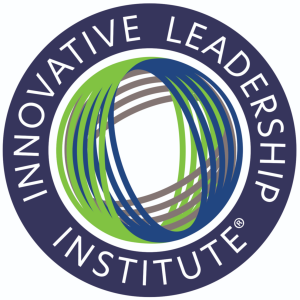
Friday Mar 03, 2023
Friday Mar 03, 2023
Guest: Mike Hardy
Mike Hardy gives an update on the progress of the Coventry Center for Peace studies. He explores both how he is navigating his personal journey to be a model for peacefulness. His center is growing into a self-sustaining center for exceptional research that underpins the evolving thinking about how we create peace in an evolving and interconnected world. At the same time, Mike shares how his choice to give up anger in his life has created a contagious environment at home and at work.
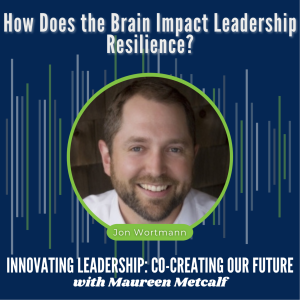
Friday Mar 03, 2023
Friday Mar 03, 2023
Guest: Jon Wortmann
Resilience is a key factor in leadership success during times of stress. Our ability to manage our own energy and thinking have a significant impact on our ability to deliver personally and on our ability to inspire our followers. By building our resilience and creating a culture where others are expected to build theirs, we can make a significant impact on driving and sustaining our success as individuals and as organizations. Jon and Maureen start with defining resilience then move to the critical aspects of personal resilience. They include a focus on how brains and bodies react to stress and practices that will reduce the impact events have on leaders. discuss their areas of expertise in brain functioning. This interview includes a discussion of specific tools that allow leaders to build more resilient brains and reduce emotional reactivity. These tools help leaders manage feelings thereby also reducing stress. Equipped with these tools, leaders need to build practices.
Can Resilience Differentiate You as a Leader?
The following blog is a republish of an article appearing in Forbes written by Maureen Metcalf about resilience during difficult times. The podcast How Does the Brain Impact Leadership Resilience? with Jon Wortmann provides additional resilience tools.
In times of uncertainty, resilience is one of our most important skills. I define it as "the ability to remain flexible and focused when facing change." As leaders, we are facing a higher level of volatility across the business environment than we previously faced. In the U.S., we are looking at a major political change as Republicans gain control after eight years. This upcoming transition is exposing division that was not previously evident on the surface in families, offices and communities. Such division can be healthy if addressed with a spirit of curiosity and grace. Yet, how can that happen when we view our previously trusted colleagues and even family members as “the other,” or worse?
While the political environment is the most obvious example right now, we are also seeing unprecedented volatility in financial markets and uncertainty in many sectors such as health care. Some of this is caused by politics, some by technology, and some caused by the fact that we live in a world that is much more interconnected than it used to be. We are dealing with situations we've never seen before. There is no return to the prior level of control so as leaders, we need to learn to be more agile.
Take Bill, a university director, responsible for physical and technology security. He came into work on a normal Monday morning, got his coffee, and started to plan his week. At 9:10 his world was interrupted. A young student drove off the road and onto a sidewalk trying to hit students. The student emerged from his car and began attacking others. It was the job of the director, campus security and many others to move very quickly in this situation. For Bill, resilience was critical in this moment and in the moments following the event. He needed to respond with his full attention, as people's lives and the well-being were at great risk.
Today's leaders must update their leadership thinking and behavior to keep pace with the challenges they face. In this sense, leadership is always self-renewing, and I believe resilience is the foundation of it, because, as we face accelerating change, we also face an increasing occurrence of people who respond to these changes with different perspectives. If we can integrate these differing perspectives in every area of our lives -- work, politics, in our communities and at home -- to create more comprehensive and durable solutions, we are all served by the process. If, however, we discount others because they have perspectives we disagree with, or, even worse, see them as “wrong,” we lose the value of learning and risk the relationships required to thrive in times of challenge.
Back to our example, if Bill had only considered one facet of security, his team would have been ill-equipped to deal with a complex attack.
So, as a leader, how can you build resilience to navigate the challenges you face in work and life?
Using innovative leadership as the foundation for this discussion, we can parse resilience into four categories:
Maintain physical well-being.
This is the category most of us understand and often ignore. We need to get enough sleep, we need to eat healthy food and manage caffeine and alcohol. It is also important to find a practice to rejuvenate ourselves physically. I recommend a combination of physical exercise and relaxing to include meditation and mindfulness. It is hard to respond to challenge when you are exhausted, caffeinated or hung over.
Manage thinking.
This category is the one I think we most often miss and is a skill that can be learned even in the busiest of times. It involves paying attention to what you are thinking and stopping the negative “self-talk” as soon as you notice it. Self-talk is that inner conversation most of us have that serves as the inner critic, giving negative feedback even when no one else is around to do it for us. Think of this as adopting the most critical person in your life and inviting them to live with you. What would life be like if instead you adopted the most adoring person in your life and invited that person to live in your head?
Managing thinking shifts the self-talk and the tendency to dwell on the negative or risky. I am not suggesting we become unreasonably positive or dismiss risk, but rather, understand the risk and put plans in place. Then, trust ourselves and others to navigate whatever difficulties arise.
Fulfill purpose and emotional intelligence.
If you have a clear sense of purpose, it is much easier to keep life’s challenges in perspective. This would be summarized by the adage, “Don’t sweat the small stuff, and it is all small stuff.” I would modify that to say, “Understand what is small and don’t sweat it.”
The second half of this recommendation is about being emotionally intelligent. There are books written on emotional intelligence, but for the sake of brevity here, I would say be aware of your thinking and emotions (see above) and manage them intentionally. Secondly, be aware of others, and manage those relationships intentionally as well.
Harness the power of connection.
Have people in your life who support you. I recommend having people at work who can serve as sounding boards and thought partners. I also suggest having connections outside of work who can give you good counsel. Then, have at least one person in your life who just thinks you walk on water no matter what.
While Bill’s story is more extreme than most of us face on a Monday morning, we all face situations that are unexpected and highly stressful, where something bad could happen to our organizations and possibly risk our well-being or job security. Personal resilience boosts our ability to navigate these situations and instill confidence in the people who follow us and expect us to lead during the most difficult moments of our lives.
About the Author
Maureen Metcalf, CEO of the Innovative Leadership Institute, is a renowned executive advisor, coach, consultant, author and speaker.
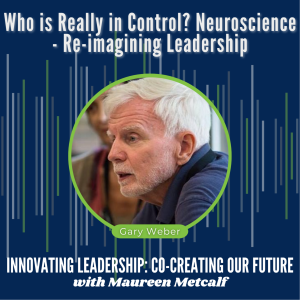
Friday Mar 03, 2023
Friday Mar 03, 2023
Guest: Gary Weber
Gary and Maureen talk about the leadership “operating systems” people are working with based on our brain programming and our level of conscious awareness of this operating system. When we increase our awareness, we can reprogram this operating system to move beyond the survival and ego based system to a more deliberate, service based, long term success oriented system. In our current time with increasing complexity and challenge, we as leaders need to commit to updating this operating system to ensure future generations thrive. This updating is something that must be done by each leader – we can’t look to those in political roles or senior roles to take care of it – all of us have a responsibility. The discussion includes an in-depth discussion of: 1. how decisions are made by the brain, 2. the impact of confirmation bias and how to navigate it, 3. the illusion of control, how to relinquish this perception, and the benefit of making this change
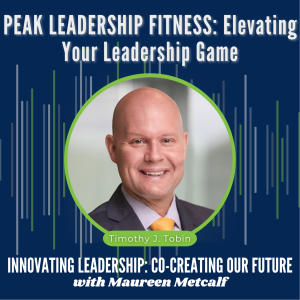
Friday Mar 03, 2023
Friday Mar 03, 2023
Guest: Timothy J. Tobin
Leadership is an acquired skill, requiring rigorous training, not unlike attaining physical fitness. Just as you can’t wake up one day and decide you will achieve all your fitness goals in a day, it’s necessary to make a commitment to leadership excellence and then execute a disciplined plan with specific targets. Tobin Draws on personal experience, the experiences of others, as well as adult learning and development and leadership research, as he shares the lessons he’s learned in his new book PEAK LEADERSHIP FITNESS: Elevating Your Leadership Game. Focusing on the intersection of physical and leadership fitness, the book helps identify where to get started and which activities will guide and support the ongoing journey toward peak fitness. Like physical fitness, your journey to peak leadership fitness begins with a commitment and requires action. It is not a single, discrete activity. It is a mindset of continuous improvement.
Improve Your Sleep for Increased Productivity
This blog is part of the extra blog series we are doing as encouragement in these uncertain times. As we face the added pressures of working from home, having children home from school, and being all under the same roof all the time, we hope you find some tips for sleeping well. Be sure to do some self-care to do your best for your family and your job.
In stressful times, it can be easy to try to burn the candle at both ends. You will want to work harder to make up for failings in your company, the economy, or at home and this can often lead to sleeping less in hopes that you’ll be more productive.
While there are ways that you can sleep less to improve your productivity, it is still important to get quality sleep because that will allow you to be more productive during your day. There are many ways that sleep, which can often feel like a luxury you don’t have time for, helps you to be more productive.
Recover from Distractions Sooner
Every working day has its distractions, from the random question of a co-worker to that urgent email that needs attention. Often what happens when these distractions come through is that you immediately forget what it was that you were working on beforehand and it takes an inordinate amount of time to return to your pressing task.
When you get the sleep that you need it will make it easier for you to get back to the important task that you were working on sooner. This helps by increasing your productivity because you can easily return to your tasks after working on a distraction.
Helps Prevent Burnout
If you’ve ever had a day where you are fed up with your job, your life, and all the little things in between, it’s probably because you are suffering from burnout. Burnout can make us all hate the things that we once loved. To reduce your chances of burnout, you need to get more effective sleep.
Sleep can help you to feel more rested and grateful for the things that you have in your life. It can help you to want to do more and feel like your work is appreciated in a way that you never knew was possible. It can also help you to feel more effective at your job.
Improves Decision Making
When you’re sleep-deprived, it can affect your decision-making skills. It can be hard to decide between what task to do, or what decision is the most effective. Decision-making becomes harder the less sleep that you get because your brain is tired and hasn’t had the time that it needs to recover from being worked tirelessly the day before.
By getting the quality sleep you need, you become able to make decisions easily. Being able to make decisions in an easier manner allows you to be more productive as these determinations are put into place sooner. Quicker decisions allow for tasks to be completed faster making your day more productive.
Increases Memory Function
Being tired means that your brain isn’t functioning at its peak performance capabilities. To become more efficient in your day you will need to get the sleep that your mind needs to function properly. While it can be easy to try and stay awake later and wake up earlier to get more done, it’s not always the most efficient use of your time.
Taking the time to get a good night’s sleep will help your memory function faster, giving your brain the power to remember tasks quicker allowing you better performance during your day. This increases your productivity ten-fold because it allows you to rely more on your memory than in times when you didn’t get enough sleep.
Reduces Mistakes
Reducing your sleep will often increase the number of mistakes that you make during your day. Mistakes are common among people who are sleep deprived and it’s often the people that need to make fewer mistakes that choose to reduce their sleep to become more productive.
The time that you use fixing mistakes due to poor sleep habits can be easily used to enact innovative plans that create less work for you and your team. We’ve all had the unfortunate experience of having to redo a project or proposal because we read the instructions wrong or made a simple mistake that might not have occurred had we gotten better sleep.
So, what can you do to improve your sleep and be more productive?
The infographic below by SleePare helps to give ideas of things that you can try to improve your sleep routine to help you be more productive during the day.
For example, if you really want to sleep less, they offer the idea of trying to harness your natural sleep-wake clock to help you sleep less while feeling just as refreshed as you normally would. To do this you need to understand the sleep cycle and structure your sleep time to ensure that you only wake up after you’ve been through all the different cycles of sleep.
You may have experienced this by having woken up for no particular reason at 5 o’clock in the morning and feeling very refreshed. This means that you were able to sleep effectively and get all the rest that your brain and body needed without sleeping until your normal wake time. They suggest that in order to fully harness this sleep cycle you focus on going to sleep and waking up at the same time that this occurred. It will help you add hours to your day.
About the Author
Jennifer Chonillo is a longtime sleep enthusiast and Content Marketing Specialist for Sleepare home of the mattress compare tool. In her free time she plays magic the gathering and goes on long walks with her dog.

Friday Mar 03, 2023
Friday Mar 03, 2023
Guest: Kate Terrell
During the course of our careers we face a series of challenges in our personal and professional lives. Kate talks about how she navigated her Stage 4 cancer diagnosis while holding a significant leadership role. She discusses her personal and professional journey. She has Five Lessons in resilience that she wished my younger self knew. Whether an individual is just starting out in her career or is trying to find his Ikigai, (A Japanese concept that means "a reason for being."), Kate’s lessons are applicable: 1. What would you do if you weren’t afraid? 2. Focusing on what you can control 3. The days may be long, but the years are short 4. Practicing the art of gratitude 5. Paradigms can put you in handcuffs – explore other perspectives Kate hopes that her triumphs and failures will help individuals realize that they can live a life of resiliency and internal prosperity.
Lunch Break Leisure: 10 Activities to Relieve Stress
We are doing a few extra blog posts for the next couple of weeks as encouragement in these uncertain times. This extra blog has some great ideas to give yourself a break as we face the added pressures of working from home, having children home from school, and being all under the same roof all the time. Be sure to do some self-care to do your best for your family and your job. Here is a link to an interview on resilience that may encourage you: Five Lessons in Resilience: Overcoming Life's Challenges with Kate Terrell.
If you’re like most Americans, you probably suffer from some level of work-related stress. According to The American Institute of Stress, 83 percent of workers report being stressed out from work, with 57 percent saying it’s so bad they feel paralyzed by it. Workplace tension is triggered by several factors, especially company culture, lack of work-life balance, and strained relationships with bosses and co-workers. And it can have a detrimental effect not only on your productivity during the day but also on your overall health, well-being, and mood.
Luckily, you can do some simple things to relieve some of the pressure during the workday. According to the experts, employees need short, periodic breaks to recharge their batteries, boost their attention span, and, ultimately, improve their job performance. Here are a few things you can do to tap into a state of leisure on your lunch break, even if you’re feeling totally zapped of motivation and energy.
Watch a Funny Video—All those hilarious YouTube videos you saved for a rainy day may be just what you need for a midday destress. A 2015 study conducted by two psychological scientists at the University of New South Wales found that employees who watched an eight-minute video at work experienced an energizing effect that counteracted the effects of mental depletion. Yep, all those hilarious cat videos could make you happier and healthier!
Make Art—Creating something meaningful, whether it be a poem, a painting, a drawing or some gorgeous rhinestone art, can help you sink into a state of deep relaxation and focus on something other than work. At the same time, being creative serves as an act of self-expression, allowing you to offload some of the pressure or stress that tends to build up during the workday.
Color—Studies show that adult coloring reduces stress and boosts creativity because it relaxes the brain, flows attention away from ourselves and provides a low-stakes activity that’s purely pleasurable. Another fun spin on adult coloring is the popular trend of making diamond art, which lets you color in complex designs with glimmering rhinestones, triggering the same calming effect. Grab a few diamond art kits to keep at your desk and work on each day during short breaks.
Take a Walk—We probably don’t have to cite any sources here! We all know that exercise is one of the best and most well-proven stress relief activities ever, no matter if you take a cycling class, learn some hip-hop moves on YouTube or practice outdoor yoga. Taking a midday walk around the office is the perfect lunch break activity because it’s distracting and boosts your mood but doesn’t leave you feeling sweaty or too tired to go back to work.
Stretch—Sitting for hours on end at a desk can cause you to store physical tension, tightness and pain in your upper back and shoulders. The physical effects of being stationary all day can lead to feelings of psychological stress, but you can counteract some of these challenges by taking two or three 15-minute breaks throughout the day to stretch and focus on something other than work.
Knit—Knitting, crocheting, cross-stitching and other needlework activities are perfect for the workday because they’re fairly self-contained. You can keep all your tools and supplies in a small bag or container that you can either leave in your desk drawer for an anytime distraction or take to and from the office so you can also work on it at home. Needlework is similar to crafting and coloring in that it diverts attention away from the stress trigger and provides steady, calming focus in its place.
Listen to Music—Music is the ultimate distractor, and it’s one of the few things in life that can instantly affect your mood in a million different ways. Keep some well-stocked playlists handy for those especially stressful days, with upbeat, energizing or relaxing tunes that take you to another place and help you unwind, even if only for 10 or 15 minutes while you eat lunch.
Talk to Friends—Never underestimate the power of good conversation. Whether you meet an old friend for lunch or vent to your co-worker over a short walk, letting out your frustrations and listening to others can help you sort out your feelings and discover new ways to handle them. It also helps provide you with a different perspective, so you look at things differently and stress less.
Write—There’s no denying it: Journaling, or even just jotting down your feelings, is good for the mind. In fact, a study from UCLA showed that putting your feelings into words actually produces therapeutic effects in the brain. Visualizing certain words on paper activates the prefrontal region of the brain and lowers its amygdala response, which tends to trip when your body is in danger. In other words, writing your feelings down literally calms the brain.
Play a Game—Few things bring quite as enjoyable a distraction as playing a game. Whether on your phone, computer or tablet or even with a tabletop or board game, playing a game throws you into a totally different reality, effectively giving you some relief from the stressors of daily life. Consider looping in fellow gamers around the office so that you get both the benefits of gaming and the benefits of social interaction during a single lunch break.
Make Taking a Break a Priority
We’re all overworked, with many tasks, meetings, and stressors to manage. The key to giving yourself some relief is to make taking frequent, short breaks a priority. You should be entitled to a certain amount of breaks each day depending on the laws where you live, so don’t be afraid to take them. It may be exactly what you need to be happier, healthier and more productive.
About the Author
Vanessa Adams serves as the marketing coordinator for Diamond Art Club, which offers the highest quality diamond art kits on the market. She oversees all content creation from their West Hollywood, California Headquarters. In her spare time, she enjoys true-crime podcasts and pilates.

Friday Mar 03, 2023
Friday Mar 03, 2023
Guest: Lynn Shollen & Sam Wilson
We are excited to showcase two current leadership researchers and their findings, one from the United States and the other from Australia. We will discuss the development and key results of the first annual Attitudes about Leadership in the United States survey conducted by Lynn Shollen of Christopher Newport University. This survey examines the public’s attitudes about leaders and leadership, perceptions of influences on leadership at various levels and in different sectors, and factors affecting willingness to follow, among other topics. Also featured will be The Australian Leadership Index with its co-creator, Sam Wilson. This research measures perceptions and expectations of leadership for the greater good in twelve institutions across the government, public and private and non-profit sectors in Australia.
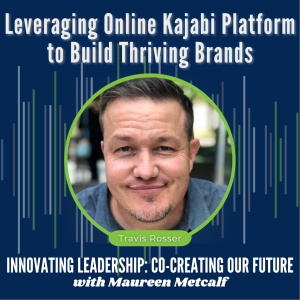
Friday Mar 03, 2023
Friday Mar 03, 2023
Guest: Travis Rosser
Many companies are facing a serious challenge in navigating the increased impact online platforms have to disrupt businesses - either enabling them or upending them. Kajabi is such a platform. During this interview, one of the founders, Travis Rosser and Maureen Metcalf discuss how Kajabi can be leveraged across a broad range of applications to support organizational and individual success. Kajabi offers a cost effective solution to building online training content that can be used to help companies connect and support clients, onboard employees, educate internal staff, educate clients and patients and many more applications. We hope this conversation challenges you as a listener to consider how you can use this or other platforms to enhance how you train internal staff and build stronger relationships with your customers. If you are thinking of starting a business, Kajabi is a great place to explore your ideas and test market receptivity.
Leveraging Technology To Improve Leadership Development
This interview may be useful for those looking to use online platforms instead of in-person instruction. The following blog is a republish of an article in Forbes by Maureen Metcalf. It is a companion to the podcast Leveraging Online Kajabi Platform To Build Thriving Brands.
As a university adjunct faculty member, consultant, and coach, I have been using the tagline of “Innovative Leadership” for many years. This sets the bar for how I commit to my work as well as the services I deliver. I recently started to explore how I could refresh my use of technology to teach leadership in conjunction with coaching and workshops. I am looking for options to accelerate the leader’s learning process and offer a broad range of tools for different learning styles. I want to share my experience of how I am leveraging this technology to support leaders in their development.
I researched the many robust online delivery options and selected a tool that was a solid fit for my work: Kajabi. I selected it because of the strong technology platform, strong start-up support, cost-effectiveness, integrated payment and affiliate tracking modules and the ability to communicate with participants by product.
With the support of the online platform, I am rethinking what is possible. Right now, I am using the online training for the following three applications initially and I will expand these as we use the platform.
1. We recently launched a 10-month IT leadership development program. This program was designed to build skills in the IT community in order to build the talent pipeline for senior roles. It will be delivered through monthly in-person sessions in conjunction with our local CIO forum. The online platform allows us to deliver training that integrates structured exercises, case studies and audio interviews with local CIOs and executives. One of the key objectives of the in-person sessions is to learn content and build a network. We expect the online element to significantly accelerate the building of leadership skills for mid- to senior-level IT professionals.
The online platform allows us to track payment and engagement with the materials. As the facilitator, this lets me manage the finances easily and also identify who is highly engaged so we can offer additional resources to enrich their experience. It also tells me who is less engaged so I can reach out and troubleshoot.
2. We often augment our leadership coaching programs with a series of exercises designed to help participants build self-awareness, knowledge and skills. Especially for emerging leaders, we deliver a hybrid of training and coaching to prepare them to step into larger roles. For this group, we created a standard curriculum with exercises, case studies, audio interviews and videos. I can monitor client progress through the platform, and in this case, they share their progress prior to coaching sessions and discuss how their learning can improve their leadership work.
The online platform offers the option to package the leadership development curriculum by leadership level. I can sell packaged offerings of coaching and online training. It also gives the option to support affiliates so the other coaches and consultants in our organization work from a single platform with consistent processes and offerings.
3. We offer online development programs as standalone offerings for individuals and companies to provide effective (and cost-effective) training for their emerging and current leaders. These programs can be combined with other programs the companies are conducting. Because this program is comprehensive and participants work through it over time, it provides the opportunity to internalize the learning, not just attend and depart.
The online platform allows us to customize materials for specific groups and tweak other courses where appropriate to reinforce and build on the in-person development investments they are making.
Another element we will be building into the platform that we are very excited about is an assessment that will be used by those taking courses, and it is also offered as a standalone service. Because an online platform can support a range of services, we are able to create a clean and user-friendly purchasing experience.
I have struggled for years to present a simple path for clients. Our company website is highly complex and positions us as a thought leadership and executive advisory firm. While that works for some audiences, it is inappropriate for others. Using Kajabi as our online platform and linking it to our main site and our book website, we can tailor the user experience to the target audience in a manner that is cost-effective for us and easy for the user.
I talk about the most effective leaders acting like scientists. This endeavor is one of my experiments. I did my homework and selected this platform. We are implementing several modules and we will continue to test and refine our experiment as we go along. For other coaches and consultants looking to extend your offering, I encourage you to explore the broad range of options for technology to enable and even extend the strong impact you are already having on clients.
About the Author
Maureen Metcalf, CEO of the Innovative Leadership Institute, is a renowned executive advisor, coach, consultant, author and speaker.
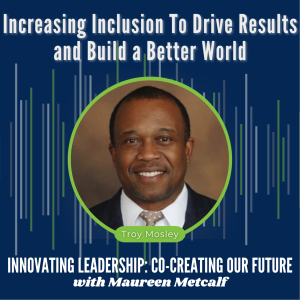
Friday Mar 03, 2023
Friday Mar 03, 2023
Guest: Troy Mosley
Troy discussed his newly released book: Unwritten Truce: The Armed Forces and American Social Justice. Inclusion is a good organizational practice. The global market is diverse. Having a diverse work-force is a strategic advantage because It provides any organization with a greater ability to understand various segments of their consumer base and develop products and services that will better resonate with these segments and therefore drive better results and higher impact. In for profit businesses – it drives higher and more sustainable profits. Troy talk about his journey as a man of African American heritage and his recommendations to increase inclusion and results. In addition to his story, Troy and Maureen discuss the challenges and recommendations to increase inclusion and address the recent challenges that are surfacing as the "Me Too" movement and many others. It is imperative that leaders create an environment that promotes a healthy environment!
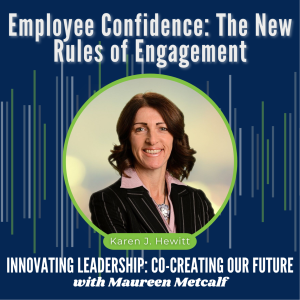
Friday Mar 03, 2023
Friday Mar 03, 2023
Guest: Karen J. Hewitt
In today’s interconnected economy, companies need all employees, not just senior leaders, to adapt to change and make decisions and take ownership of their work. This is commonly referred to as ‘employee engagement’ in management literature, but the real challenge lies not in making employees more engaged, but in making them more confident in their decision-making and ability to lead change. In EMPLOYEE CONFIDENCE: The New Rules of Engagement, expert Karen J. Hewitt explains what employee confidence is and how to instill it in all employees, not just the high potentials; the cumulative power of all employees thriving means the company operating at maximum potential too. While it’s ultimately the responsibility of individuals to become more confident, leaders have a responsibility to create workplaces that encourage Employee Confidence. Employee confidence is an approach to and evidence of culture change, giving you human capital that delivers value far beyond your expectations.
Tips to Succeed at America’s Toughest Interviews
Unfortunately, many have seen jobs disappear or be cut back. This post is guidance on potential job interview questions. It is a chance to hone your skills and be prepared when the right job opens up. Karen J. Hewitt shares her insights in the podcast Employee Confidence: The New Rule of Engagement.
Spending time inside while quarantined gives you the opportunity to focus on professional development and self-improvement. It’s a chance to hone in on your long-term career goals and sharpen up your interview skills. If you ever must leave your current position and re-enter the competitive job market, you will want to be prepared.
Has it been years since you have practiced for an interview? By taking a look at the interview processes of America’s top tech companies, you can refresh your memory and learn key strategies. After all, it is not only the big tech companies that use these techniques during interviews. Nowadays, businesses across industries follow the same best practices for interviewing job candidates.
When you understand how to answer the types of questions asked by interviewers at Google, Facebook, and Twitter, you will feel ready for anything. Let’s outline some of these interview questions and tips on how to respond below. Plus, check out a helpful graphic from the experts at LiveCareer below, which nicely illustrates this interview advice.
Any company that dedicates itself to investing in quality talent will not have an easy interview process. There will never be a foolproof way to set yourself up for success in an interview. Google probably would not have such a tough interview process if it was not a top company that receives millions of applications a year. Once you have already spent time and energy perfecting your resume and landing the interview, you want to maximize your chances of acing the interview. Let’s hope you can use these takeaways to aid in your job search.
About the Author
Gabrielle Gardiner is an NYC-based content creator who enjoys writing helpful articles about professional development for companies like LiveCareer. She’s passionate about sharing her insights to empower people to succeed in their careers.

Friday Mar 03, 2023
Friday Mar 03, 2023
Guest: John Heiser
Values conflicts arise frequently in the workplace. Effectively raising and addressing those conflicts as they arise will lead to a more engaged, satisfied workforce that will also drive superior performance. John Heiser joins the program to explain the Giving Voice to Values program that provides a proven framework that can be implemented in a global context. John will also talk about his involvement in and the value of the International Leadership Association.
